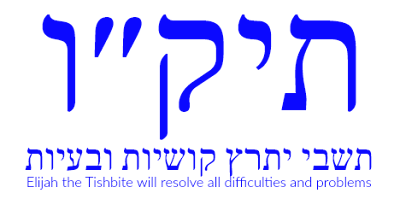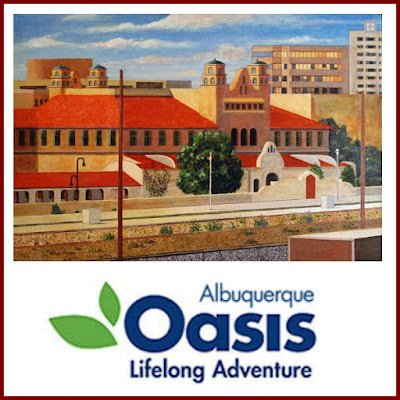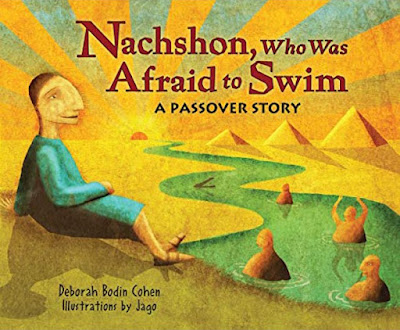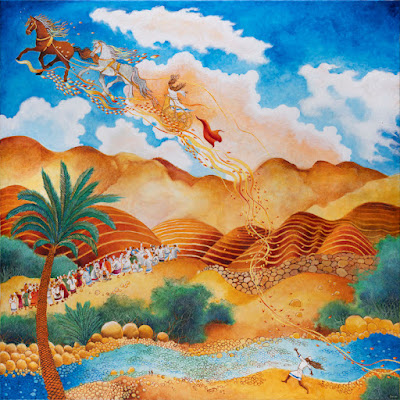Just In Time for Passover! How did the figure of Elijah change over time, from a zealous prophet into an immortal, compassionate being who revisits earth to rescue and enlighten—perhaps the most popular figure in Jewish folklore? How was he reimagined by each generation?

Abq Jew is happy to inform you that Professor Daniel C Matt, of the Graduate Theological Union in Berkeley, CA, has answered those questions - and many, many more, in his new book Becoming Elijah.
About which Professor Matt gave a Book Talk this past Sunday, sponsored by The New Lehrhaus, which Abq Jew (and about 100 others) was privileged to attend via Zoom. (Click here for the video and here for the handout.)
As we all know, Elijah is famous because (among other things) he ascended into heaven alive, one of only two human persons the Bible tells us did so:
As they went along, walking and talking,
suddenly a chariot of fire and horses of fire appeared,
separating the two of them, and Elijah went up to heaven
in a whirlwind. Elisha was watching and kept crying out,
“My father, my father! Israel’s chariots and horsemen!”
And he saw him no more. (2 Kings 2:11)
Question: Who was the other one?
For every one of you, Abq Jew's loyal readers, who answered Enoch - mazeltov and l'chaim! You are indeed correct!
And Enoch walked with God, and he was not;
for God took him. (Genesis 5:24)
Note: Wikipedia has a fascinating entry for Entering heaven alive, detailing who, in a variety of religious traditions (eight in post-Biblical midrash), had the privilege of entering heaven without dying first. Most of us are not offered this option, which is why we need the Chevre Kaddisha.
Ah, yes. Kazablan!
As we all knew or learned from the 1974 Israeli film
Kazablan, Elijah is offered a seat of honor at every Brit Milah. Why? Because Elijah told G-d that Israel had forsaken this covenant and should therefore be punished.
The Midrash says that G‑d rebuked him, saying: “They abandoned My covenant, not yours; they dismantled My altars, not yours; they killed My prophets, not yours. Why are you more zealous than I!?
“I vow,” continued G‑d, “that whenever My children make this sign in their flesh [i.e., whenever there is a circumcision], you will be present, and the mouth which testified that the Jewish people have abandoned My covenant will testify that they are keeping it."
By attending every circumcision, Elijah was given the opportunity to rectify his error by testifying in their favor and to their credit that they do keep the covenant.
And then there's Pesach.
Elijah is certainly invited into every Jewish home every year on Passover, and is given his own cup from which to drink. The Vilna Gaon explains:
We have the custom of pouring a fifth cup and calling it the Cup of Elijah the prophet. The reason is that there is a dispute in the Gemara over whether one needs a fifth cup, and the halakhah is not determined.

Therefore, based on this doubt, the cup is poured but not drunk, and it is called the Cup of Elijah, for when he comes, all doubts will be clarified, including this doubt.
And then there's the Zohar.
Daniel Matt is the author of The Essential Kabbalah and God and the Big Bang. Among other works, of course. But his greatest accomplishment (in Abq Jew's humble opinion) is the 2018 translation of the Zohar, which has been called "a monumental contribution to the history of Jewish thought.”
About the Zohar Pritzker Edition project, Stanford University Press tells us:
In a monumental undertaking, Daniel C. Matt, one of the world's foremost authorities on Jewish mysticism, has spent 20 years creating a 12-volume, annotated English translation of the Zohar.
This is the first translation ever made from a critical Aramaic text of the Zohar, which has been established by Professor Matt based on a wide range of original manuscripts.
The extensive commentary, appearing at the bottom of each page, clarifies the kabbalistic symbolism and terminology, and cites sources and parallels from biblical, rabbinic, and kabbalistic texts.
The translator's introduction is accompanied by a second introduction written by Arthur Green, discussing the origin and significance of the Zohar.
And then there's Berkeley.
Something in the water? Something in the air?





























